Unit 5 Wild animals Integrated skills 课件+音频(共15张PPT在,含内嵌视频) 牛津译林版英语八年级上册
文档属性
| 名称 | Unit 5 Wild animals Integrated skills 课件+音频(共15张PPT在,含内嵌视频) 牛津译林版英语八年级上册 | 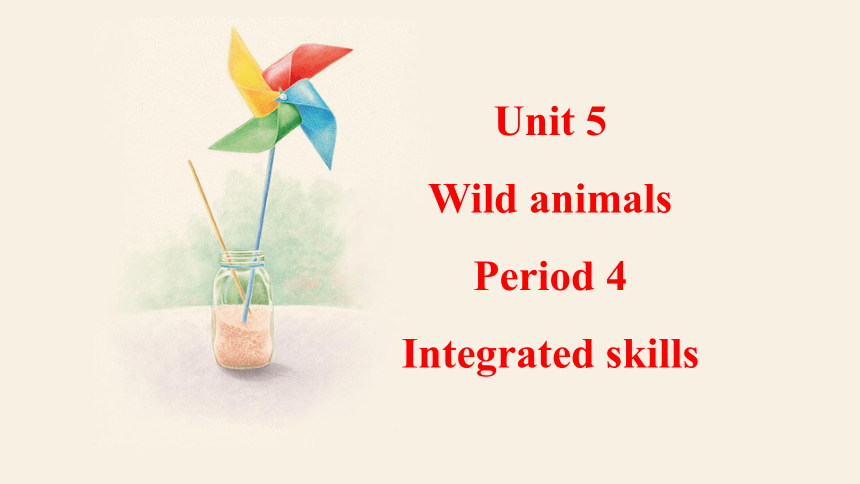 | |
| 格式 | pptx | ||
| 文件大小 | 35.5MB | ||
| 资源类型 | 教案 | ||
| 版本资源 | 牛津译林版 | ||
| 科目 | 英语 | ||
| 更新时间 | 2023-12-23 11:41:51 | ||
图片预览

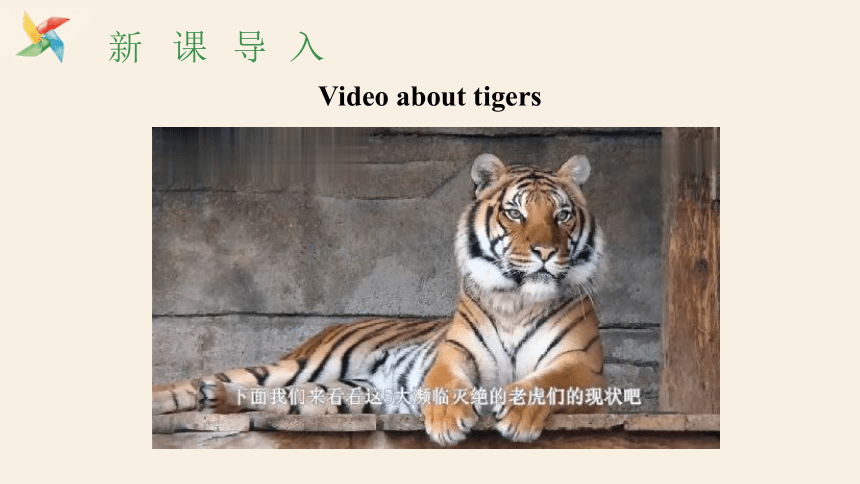
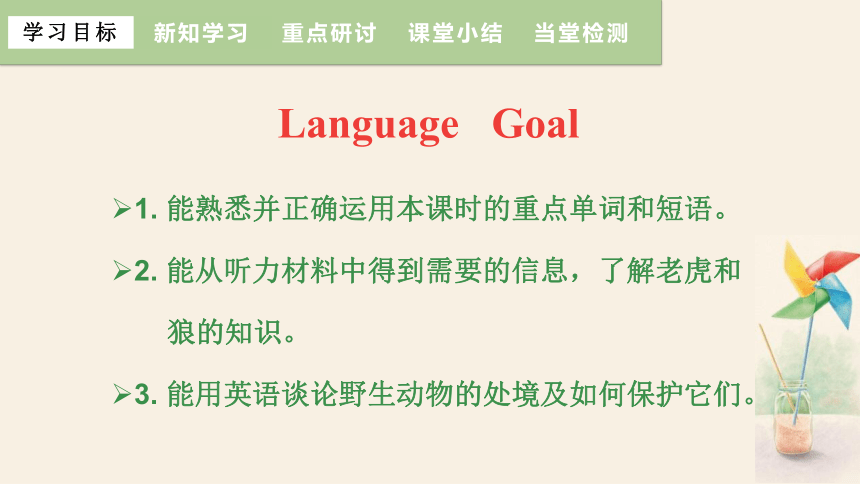
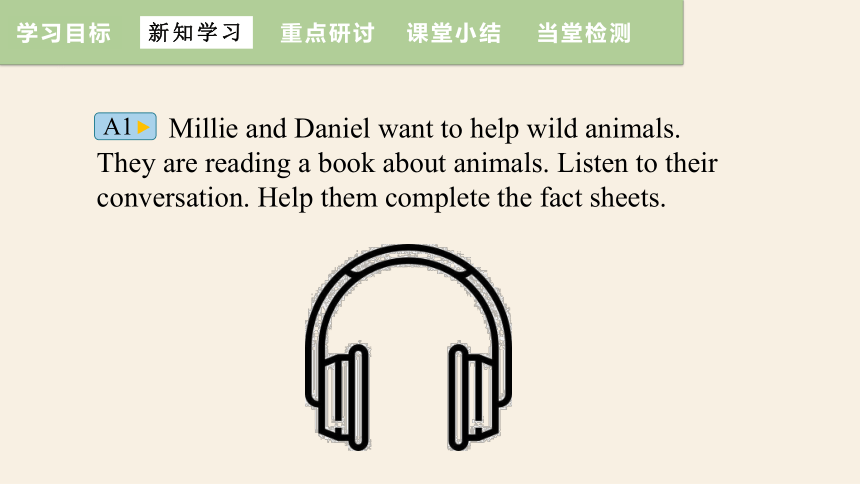
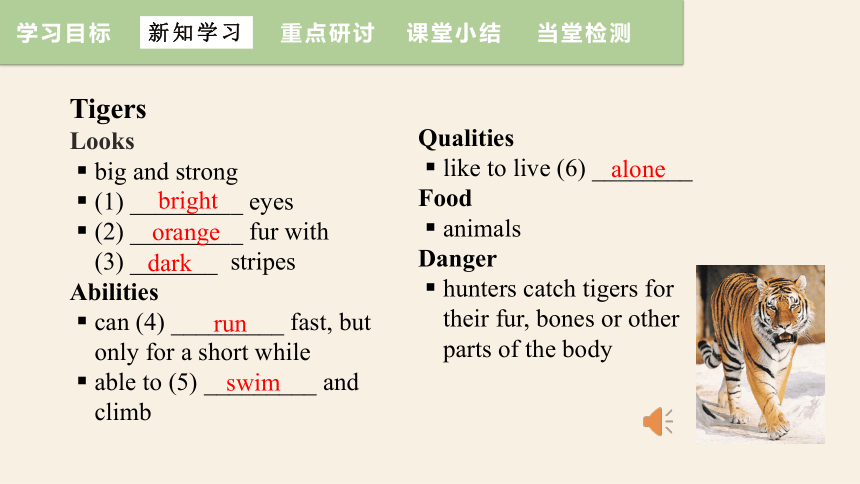
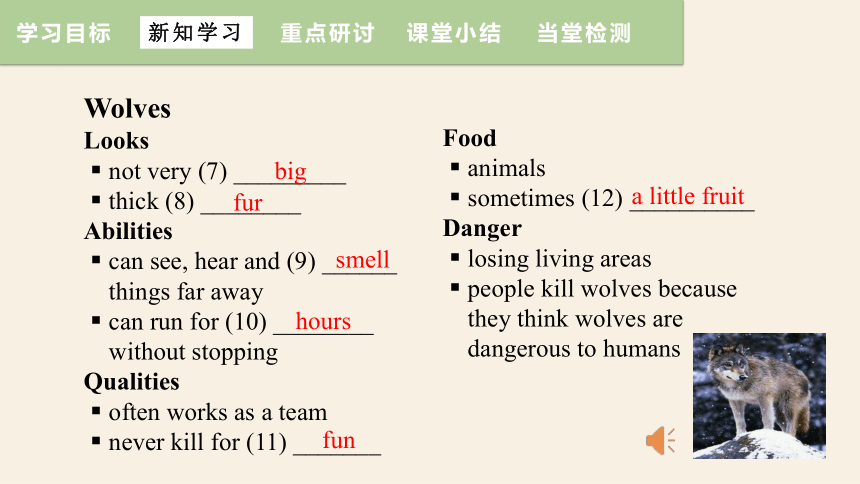
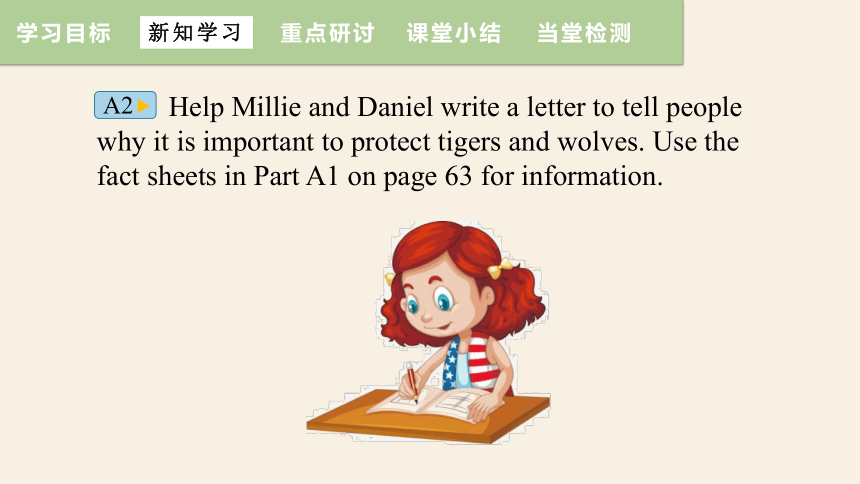
文档简介
(共15张PPT)
Unit 5
Wild animals
Period 4
Integrated skills
新
课
导
入
Video about tigers
Language Goal
新知学习
课堂小结
当堂检测
学习目标
重点研讨
1. 能熟悉并正确运用本课时的重点单词和短语。
2. 能从听力材料中得到需要的信息,了解老虎和
狼的知识。
3. 能用英语谈论野生动物的处境及如何保护它们。
新知学习
课堂小结
当堂检测
学习目标
重点研讨
Millie and Daniel want to help wild animals. They are reading a book about animals. Listen to their conversation. Help them complete the fact sheets.
A1
▲
新知学习
课堂小结
当堂检测
学习目标
重点研讨
Tigers
Looks big and strong (1) _________ eyes (2) _________ fur with
(3) _______ stripes Abilities can (4) _________ fast, but
only for a short while
able to (5) _________ and
climb
Qualities
like to live (6) ________
Food
animals
Danger
hunters catch tigers for
their fur, bones or other
parts of the body
bright
orange
dark
run
swim
alone
新知学习
课堂小结
当堂检测
学习目标
重点研讨
Wolves
Looks
not very (7) _________
thick (8) ________
Abilities
can see, hear and (9) ______
things far away
can run for (10) ________
without stopping
Qualities
often works as a team
never kill for (11) _______
Food
animals
sometimes (12) __________
Danger
losing living areas
people kill wolves because
they think wolves are
dangerous to humans
big
fur
smell
hours
fun
a little fruit
新知学习
课堂小结
当堂检测
学习目标
重点研讨
Help Millie and Daniel write a letter to tell people why it is important to protect tigers and wolves. Use the fact sheets in Part A1 on page 63 for information.
A2
▲
新知学习
课堂小结
当堂检测
学习目标
重点研讨
Dear Sir or Madam,
We are writing to tell you about some wild animals in danger.
Tigers are big and (1) _______. They have very (2) ______ eyes. Tigers like to live (3) ______. There are not many tigers in the world now. Tigers are in danger because people catch them for their fur, (4) _______ or other parts of the body.
Wolves are not very big. They can see, (5) ______ and (6) ______ things far away. They often work as a (7) ______. Sadly, they have fewer and fewer living areas, and people kill them because they think wolves are (8) ________ to humans. They are now in danger.
We think we should help these animals.
Yours sincerely,
Millie Daniel
strong
bright
alone
bones
hear
dangerous
team
smell
新知学习
课堂小结
当堂检测
学习目标
重点研讨
Millie is talking to her mum about how to protect wild animals. Work in pairs and discuss the topic with your partner. Use the conversation below as a model.
B
▲
新知学习
课堂小结
当堂检测
学习目标
重点研讨
Millie: Mum, I read a book about wild animals today. Some of them
are now in danger.
Mum: I’m sorry to hear that. It’s a great pity!
Millie: Yes. Many animals lose their lives because people hunt them.
They sell the animals’ fur, bones or other parts of the body.
Mum: What a shame! We shouldn’t buy fur coats any more.
Millie: Right. I think everybody should act to protect wild animals.
新知学习
课堂小结
当堂检测
学习目标
重点研讨
Answer the questions below.
1. Why are some wild animals in danger
They lose their lives because people hunt them. People sell their fur, bones or other parts of the body.
2. What can we do to protect wild animals
We shouldn’t buy fur coats any more.
Language Points
新知学习
课堂小结
当堂检测
学习目标
重点研讨
1. I’m sorry to hear that.
be sorry to do sth. 对做某事感到抱歉/遗憾
e.g. I’m sorry to give you a wrong number.
给错你电话号码我很抱歉。
be sorry that 对……感到抱歉/遗憾
be sorry for (doing) sth. 对(做)某事感到抱歉/遗憾
e.g. I'm sorry that I am late.=I am sorry to be late.
=I am sorry for being late. 我很抱歉我迟到了。
新知学习
课堂小结
当堂检测
学习目标
重点研讨
2. It’s a great pity!
pity 遗憾,可惜
e.g. What a pity!
真可惜!
3. What a shame!
what a shame 真可惜,真丢脸
e.g. What a shame we didn't see you earlier!
真遗憾,我们没有早点看到你!
e.g. What a shame to deceive the girl!
欺骗那女孩是多么可耻的事啊!
新知学习
重点研讨
课堂小结
当堂检测
学习目标
Unit 5
Period 4
如何保护野生动物:
我们不应该再买毛皮大衣了。
重点单词和短语:
stripe, while, quality, hunter, catch, wolf, thick, lose, living, kill, human, sorry, pity, sell, shame, act, yours sincerely, be sorry to do sth., what a shame
从方框中选择合适的单词并用其适当形式填空。
新知学习
课堂小结
当堂检测
学习目标
重点研讨
stripe, hunter, wolf, catch, living
1. Jim went skating in the park and _______ a cold last Sunday.
2. ________ like to live together.
3. His father was a ________.
4. There are thirteen _______ on the American flag.
5. Father never talked about what he did for a _______.
caught
Wolves
hunter
stripes
living
Unit 5
Wild animals
Period 4
Integrated skills
新
课
导
入
Video about tigers
Language Goal
新知学习
课堂小结
当堂检测
学习目标
重点研讨
1. 能熟悉并正确运用本课时的重点单词和短语。
2. 能从听力材料中得到需要的信息,了解老虎和
狼的知识。
3. 能用英语谈论野生动物的处境及如何保护它们。
新知学习
课堂小结
当堂检测
学习目标
重点研讨
Millie and Daniel want to help wild animals. They are reading a book about animals. Listen to their conversation. Help them complete the fact sheets.
A1
▲
新知学习
课堂小结
当堂检测
学习目标
重点研讨
Tigers
Looks big and strong (1) _________ eyes (2) _________ fur with
(3) _______ stripes Abilities can (4) _________ fast, but
only for a short while
able to (5) _________ and
climb
Qualities
like to live (6) ________
Food
animals
Danger
hunters catch tigers for
their fur, bones or other
parts of the body
bright
orange
dark
run
swim
alone
新知学习
课堂小结
当堂检测
学习目标
重点研讨
Wolves
Looks
not very (7) _________
thick (8) ________
Abilities
can see, hear and (9) ______
things far away
can run for (10) ________
without stopping
Qualities
often works as a team
never kill for (11) _______
Food
animals
sometimes (12) __________
Danger
losing living areas
people kill wolves because
they think wolves are
dangerous to humans
big
fur
smell
hours
fun
a little fruit
新知学习
课堂小结
当堂检测
学习目标
重点研讨
Help Millie and Daniel write a letter to tell people why it is important to protect tigers and wolves. Use the fact sheets in Part A1 on page 63 for information.
A2
▲
新知学习
课堂小结
当堂检测
学习目标
重点研讨
Dear Sir or Madam,
We are writing to tell you about some wild animals in danger.
Tigers are big and (1) _______. They have very (2) ______ eyes. Tigers like to live (3) ______. There are not many tigers in the world now. Tigers are in danger because people catch them for their fur, (4) _______ or other parts of the body.
Wolves are not very big. They can see, (5) ______ and (6) ______ things far away. They often work as a (7) ______. Sadly, they have fewer and fewer living areas, and people kill them because they think wolves are (8) ________ to humans. They are now in danger.
We think we should help these animals.
Yours sincerely,
Millie Daniel
strong
bright
alone
bones
hear
dangerous
team
smell
新知学习
课堂小结
当堂检测
学习目标
重点研讨
Millie is talking to her mum about how to protect wild animals. Work in pairs and discuss the topic with your partner. Use the conversation below as a model.
B
▲
新知学习
课堂小结
当堂检测
学习目标
重点研讨
Millie: Mum, I read a book about wild animals today. Some of them
are now in danger.
Mum: I’m sorry to hear that. It’s a great pity!
Millie: Yes. Many animals lose their lives because people hunt them.
They sell the animals’ fur, bones or other parts of the body.
Mum: What a shame! We shouldn’t buy fur coats any more.
Millie: Right. I think everybody should act to protect wild animals.
新知学习
课堂小结
当堂检测
学习目标
重点研讨
Answer the questions below.
1. Why are some wild animals in danger
They lose their lives because people hunt them. People sell their fur, bones or other parts of the body.
2. What can we do to protect wild animals
We shouldn’t buy fur coats any more.
Language Points
新知学习
课堂小结
当堂检测
学习目标
重点研讨
1. I’m sorry to hear that.
be sorry to do sth. 对做某事感到抱歉/遗憾
e.g. I’m sorry to give you a wrong number.
给错你电话号码我很抱歉。
be sorry that 对……感到抱歉/遗憾
be sorry for (doing) sth. 对(做)某事感到抱歉/遗憾
e.g. I'm sorry that I am late.=I am sorry to be late.
=I am sorry for being late. 我很抱歉我迟到了。
新知学习
课堂小结
当堂检测
学习目标
重点研讨
2. It’s a great pity!
pity 遗憾,可惜
e.g. What a pity!
真可惜!
3. What a shame!
what a shame 真可惜,真丢脸
e.g. What a shame we didn't see you earlier!
真遗憾,我们没有早点看到你!
e.g. What a shame to deceive the girl!
欺骗那女孩是多么可耻的事啊!
新知学习
重点研讨
课堂小结
当堂检测
学习目标
Unit 5
Period 4
如何保护野生动物:
我们不应该再买毛皮大衣了。
重点单词和短语:
stripe, while, quality, hunter, catch, wolf, thick, lose, living, kill, human, sorry, pity, sell, shame, act, yours sincerely, be sorry to do sth., what a shame
从方框中选择合适的单词并用其适当形式填空。
新知学习
课堂小结
当堂检测
学习目标
重点研讨
stripe, hunter, wolf, catch, living
1. Jim went skating in the park and _______ a cold last Sunday.
2. ________ like to live together.
3. His father was a ________.
4. There are thirteen _______ on the American flag.
5. Father never talked about what he did for a _______.
caught
Wolves
hunter
stripes
living
